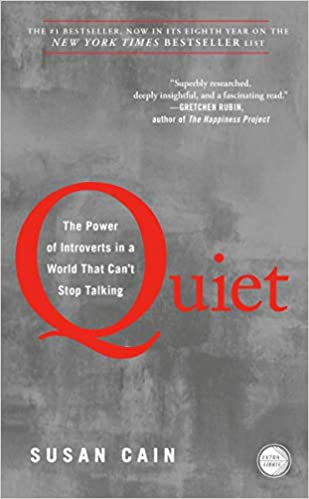
Quiet
by Susan Cain
⏱ 16 minutes reading time
🎧 Audio version available
Introverts Don’t Need As Much Supervision
Get you an introvert at the workplace, and you can guarantee yourself some peace of mind. Introverts are famous for thriving on their own. They don’t need hand-holding by a manager or a supervisor after they get assigned a task or when learning something new. Hand them a project and trust that they’ll finish it with minimal help.
An expert on the psychology of introverts, Hans Eysenck says introverts are practically tailor-made for working independently. It’s their risk-averse personality that makes them absorb the instructions like no other, and carefully follow through each step, requiring little follow up.
This sort of self-start is exactly what a company needs and why more workplaces should hire introverts. And when managers don’t need to focus as much on supervising their employees, they can give their attention to other, more important tasks, which directly impacts the effectiveness and success of your business.
Introverts Are More Creative
It’s a universally agreed upon fact that introverts are more creative. In a good mood, extroverts can brainstorm with the best of them, but that generally happens when they’re in their element, surrounded by people.
On the other hand, you can count on an introvert to come up with creative solutions and brilliant ideas. Experts at working alone; give them a problem and they’ll approach it in as many ways as possible in order to find the best solution.
Out of the box thinking is where they thrive. If your company especially needs a new marketing approach, your office introvert will surprise you.
Because they spend so much time alone, their creativity grows in abundance. According to experts,
“Solitude is often a crucial ingredient to creativity”
and it’s
“required for the unconscious to process and unravel problems.”
“Others inspire us, information feeds us, practice improves our performance, but we need quiet time to figure things out, to emerge with new discoveries, to unearth original answers.”
Charles Darwin was a known introvert. He was very proud of his introversion, crediting it to his accomplishments.
Let’s say you have an ongoing problem at work. Ask an introvert their thoughts on a solution, and you can guarantee that they have been working on an elaborate plan and are just waiting for an opportunity to speak up.
Introverts Arrive Prepared
As an introvert, having your boss confront you about not being prepared is what hell sounds like. It’s no wonder presentations and meetings are nerve-wracking for them, but introverts do the best that they can to avoid discomfort and confrontation.
Introverts are more likely to arrive over-prepared than they are to forget to prepare, which never fails to impress clients and bosses.
In addition, introverts are known to stick to deadlines better. Faced with a time-pressing, hard deadline– and this is according to a study at the University of Maryland– it’s extroverts who are more likely to freeze up.
Introverts will have that deadline in the bag.
Introverts Are Good Listeners
During any social interaction, surrounded by a group of people, you can likely pick out the introvert in the group by noticing who’s on the sidelines, quietly observing.
Introverts don’t talk as much as their extroverted counterparts, but in return, they pick up a lot more useful details. They focus on what people say, storing that information in the back of their minds, observe body language, the group’s dynamic, vocal cues, words left unsaid but hold a real message– they see everything. That means that they’re excellent people readers.
That makes valuable weapons in the boardroom. They won’t just take notes, but they’ll read between the lines and notice what’s left unsaid.
Shorter Meetings
This is a unique advantage of having an introvert in your office: if it can be said over a mass email, then you can be sure they won’t disturb the entire office and waste an hour holding an unnecessary meeting.
Extroverts tend to think of meetings as good ways to communicate with the team. But unless they have a real, beneficial agenda, introverts will disagree. With fewer meetings, more work will get done. And during the actual meeting, there won’t be any dilly-dallying.
The agenda will be talked about, goals will be met, and everyone will walk away with a sense of purpose.
Less Gossip by the Water Cooler
One drink by the water cooler can lead to hearing about someone’s long, eventful weekend– probably in the form of gossip from other coworkers. It’s likely that introverts will efficiently get their water and won’t indulge in chit chat.
Friendships and social interactions at work are incredibly beneficial, but in excess, they can hinder progress. That doesn’t mean that introverts don’t occasionally take a break, but you’re more likely to find them playing solitaire on their computer more than they’ll rope someone into a 15-minute chat.
Minding their own business is their motto; as is avoiding workplace drama and politics. Balance a team full of extroverts with a few introverts and you’ll notice a decrease in office tensions and conflicts.
They Allow Others to Stand Out
Introverts won’t hog the spotlight, and they aren’t likely to take credit for something they didn’t do. Because they shy away from being the center of attention, others on your team will get the chance to stand out.
You might even find a powerful duo on your hands, with the introvert providing brilliant ideas behind the scenes and the extroverts making enticing pitches to clients.
Being a great team player and being able to share the spotlight doesn’t mean that they can’t give presentations and pitches with the best of them. If they’re particularly passionate about a subject, they’ll deliver it with thoroughness and precision.
They’re Laser-Focused
Possessing a laser-like focus is something introverts are known for. Maybe it’s because they spend so much time in their heads, observing the world around them, and day dreaming useful ideas, but when it’s time to get serious, an introvert will hunker down and not look up until their task is finished.
Keeping your employees focused on a specific goal can be a challenge, but you know that their external environment won’t affect introverts the way it would extroverts. And maybe that focus and efficiency can inspire others to apply the same techniques themselves.
They’re Great Leaders
The last thing you think of when picturing a leader is an introvert, but you’ll be pleasantly surprised at just how well they can handle leadership positions and make them their own.
Introverts redefine what positive leadership looks like. It’s because they can handle uncertainty without acting on impulse. With their careful personalities, they will take the time to think about a problem, analyse every viable option, and then make a calculated decision.
Their tendency to be cautious results in them being less likely to take too many risks, which is something most businesses prefer.
And then– remember the part about them being great listeners? Their listening skills make them ideal leaders as well, able to listen to and connect with their team. There is a popular misconception that “introvert” directly translates to “antisocial,” and this couldn’t be further from the truth.
Introverts aren’t “antisocial.” They certainly don’t hate people. Their personalities just don’t have a tolerance to the constant social interaction that extroverts enjoy.
Susan Cain, an expert on the subject, spoke about the power of introverts in a TED Talk, saying,
“You need to understand what introversion is. It’s different from being shy. Shyness is about fear of social judgment. Introversion is more about, how do you respond to stimulation, including social stimulation. So, extroverts crave large amounts of stimulation, whereas introverts feel at their most alive and their most switched-on and their most capable when they’re in quieter, more low-key environments. Not all the time — these things aren’t absolute — but a lot of the time.”
Now do you see why more businesses need introverts in their offices?
What Is Snapreads?

With the Snapreads app, you get the key insights from the best nonfiction books in minutes, not hours or days. Our experts transform these books into quick, memorable, easy-to-understand insights you can read when you have the time or listen to them on the go.


